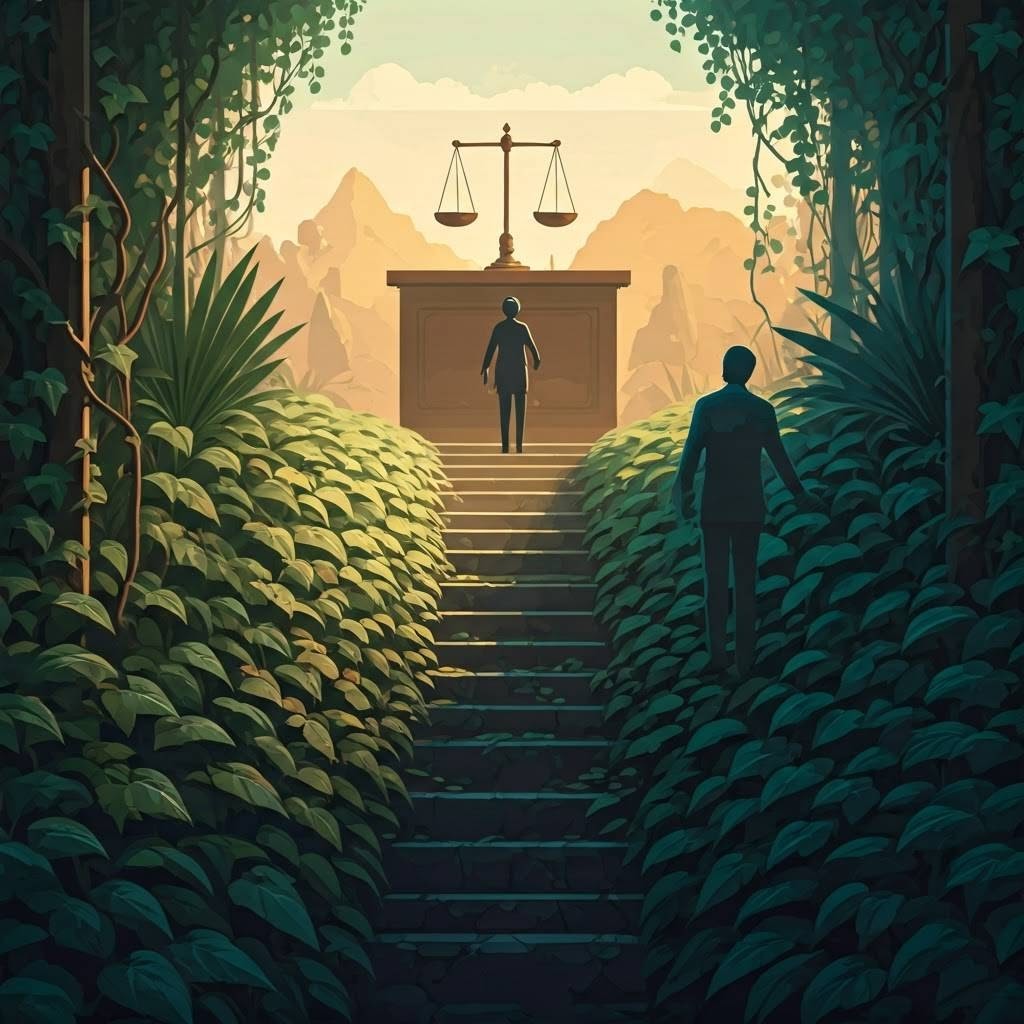

‘Del otro lado del jardín’ by Daniel Posada
- Title ‘Del otro lado del jardín’ by Daniel Posada
- Author Daniel Posada (director and screenwriter), Ignacio del Moral (screenwriter)
- Year 2024
- Language Spanish
- Tags Death Outside the Law High Profile Cases Friendship Feature Film
- Legislative context Constitutional Court Sentence C-164-22 on medically assisted suicide, 2022 (Colombia)
- Author of entry Carlos A. Pittella
In the opening scene of Del otro lado del jardín, a boy witnesses his mother’s crossing to the other side of a garden, whereas he is restrained by ivy, unable to follow. We soon realize this is a dream of Carlos Framb’s, a 40-year-old Colombian poet, who then wakes up in a hospital bed and finds himself handcuffed and accused of homicide. A few days earlier, he had attempted suicide after assisting his 82-year-old mother Luzmila Alzate to die, in what he claims was an act of love. Inspired by Framb’s 2009 memoir by the same title, the 2024 film has notable differences. Directed by Daniel Posada, with screenplay by Posada and Ignacio del Moral, the film turns the story of Carlos and Luzmila into a courtroom drama about the individual rights to death and to abortion. While the book advances chronologically, starting with the history of Framb’s family and their religious upbringing, the film opens with the aftermath of Luzmila’s assisted death and the poet’s attempted suicide (corresponding to the second half of the book). The film borrows its main narrative arc from the legal proceedings, resorting to flashbacks to develop Framb’s relationships with his mother, his brother Iván, and his mentor Ebel Botero. It is in creating the character of the prosecutor Gloria Restrepo that the film distances itself the furthest from the memoir. If the book focuses on dismantling preconceptions of suicide as a sin, the film juxtaposes assisted dying and abortion, framing them as comparable ethical dilemmas. Initially seeking the highest possible punishment for Framb’s actions as aggravated homicide, the fictionalized prosecutor reconsiders her judgment once she herself has an abortion. In the memoir – and in real life – Framb is acquitted by the Superior Tribunal of Medellín; but, in the film, it is the prosecutor who decides to drop the charges, jeopardizing her career for the sake of ethical coherence.
When Framb’s case was tried in 2008 and divulged by the poet’s memoir in 2009, it faced a legal vacuum. Even though euthanasia was decriminalized by the Colombian Constitutional Court in 1997 (Sentence C-239-97), detailed guidelines have yet to be issued by Congress. As of 2015, however, through a series of sentences and resolutions, the constitutional right-to-die was expanded to cover minors, as well as the non-terminally ill. Therefore, in comparison with the memoir, the 2024 film was made and released within a very different legal landscape. In 2022, the Constitutional Court prioritized biographical over biological life and recognized medical assistance in dying as a personal claim of agency regarding one’s time of death (Sentence C-164-22). Also in 2022, the same Court declared that abortion, if carried out within the first 24 weeks of pregnancy, cannot be a crime under Colombian law (Sentence C-055-22). It is telling, thus, that the 2024 film portrays both assisted dying and abortion as complementary issues of self-determination; it dramatizes and amplifies ethical arguments present in public discourse, welcoming debate on two rights that, given their recency and scarce guidelines, may be seen as fragile. Several critics have noted how the film puts the audience in the shoes of both Framb and the prosecutor, to judge (or to refrain from judging) their dilemmas, weighing individual liberty against the interpretation of the law and morals. Didyme-Dôme, for example, sees the film’s poetic licenses as the price the adaptation pays to reframe the case as an ethical dilemma – not of Framb’s, but of judging Framb’s case when one could just as well be judged. On its launch day, Del otro lado del jardín was the most watched film in HBO Max in both Colombia and Mexico. In the second week since its launch, it entered the top ten films in the platform globally, remaining as one of the most streamed films in Colombia weeks after.
Suggested citation
-
‘Del otro lado del jardín’ by Daniel Posada, Assisted Lab’s Living Archive of Assisted Dying, 4 February 2025 <link>
Reviews
- Camila Osorio, ‘“Del otro lado del jardín”: una película sobre los juicios morales al suicidio asistido’, El País, 2024 → elpais.com
- Diego Aristizábal Múnera, ‘Del otro lado del jardín’, El Colombiano, 2024 → elcolombiano.com
- André Didyme-Dôme, ‘Crítica: Del otro lado del jardín’, Rolling Stone, 2024 → es.rollingstone.com
Media citations
- José Patiño, ‘¿A quién pertenece la vida?’, Legis, 2024 → ambitojuridico.com
- ‘“Del otro lado del jardín” y los dilemas de la muerte digna’, El Heraldo, 2024 → elheraldo.co
- Alejando Carranza, ‘“Del otro lado del jardín” no se oyen las voces silenciadas’, Las2orillas, 2024 → las2orillas.co
- ‘LIBRO ABIERTO: “Del Otro Lado Del Jardín.” Del Libro a La Escena’, ITM Académico, 2024 → youtube.com
- ‘“Del otro lado del jardín”: La muerte digna que se enfrenta a la ley’, El Espectador, 2024 → elespectador.com
Related Archival Entries
'Del otro lado del jardín' by Carlos Framb

Carlos Framb
After assisting in his mother Luzmila Alzate’s death in 2007 and unsuccessfully attempting suicide, the poet Carlos Framb found himself accused of homicide. This memoir recounts Framb’s legal saga, his relationship with his mother, and defends the right-to-die in the context of Colombia, that had decriminalized euthanasia in 1997 but not yet created guidelines for assisted dying.